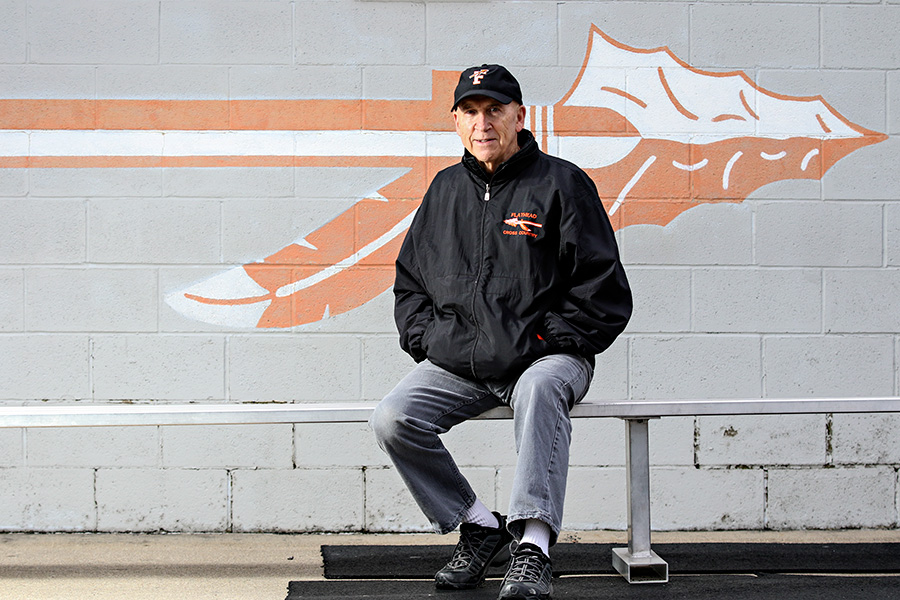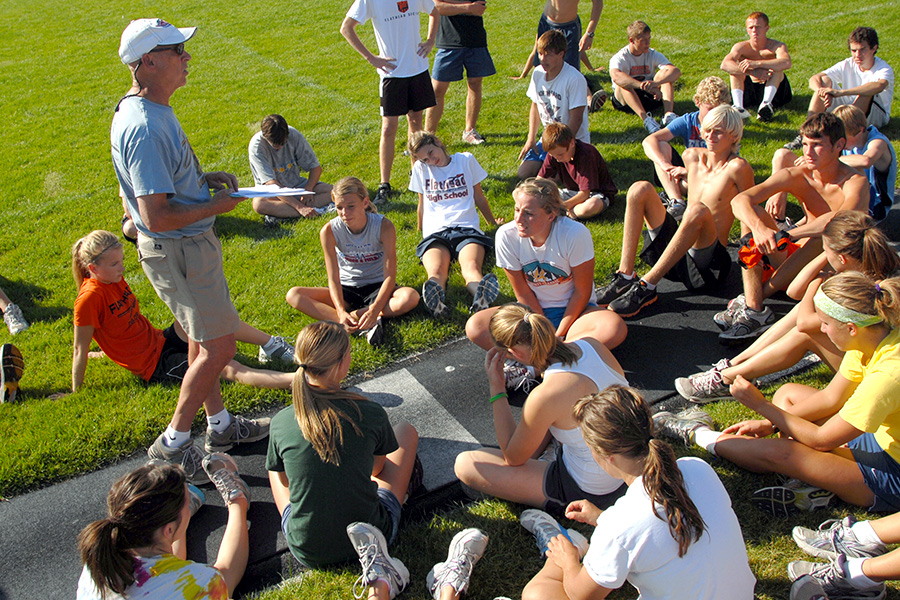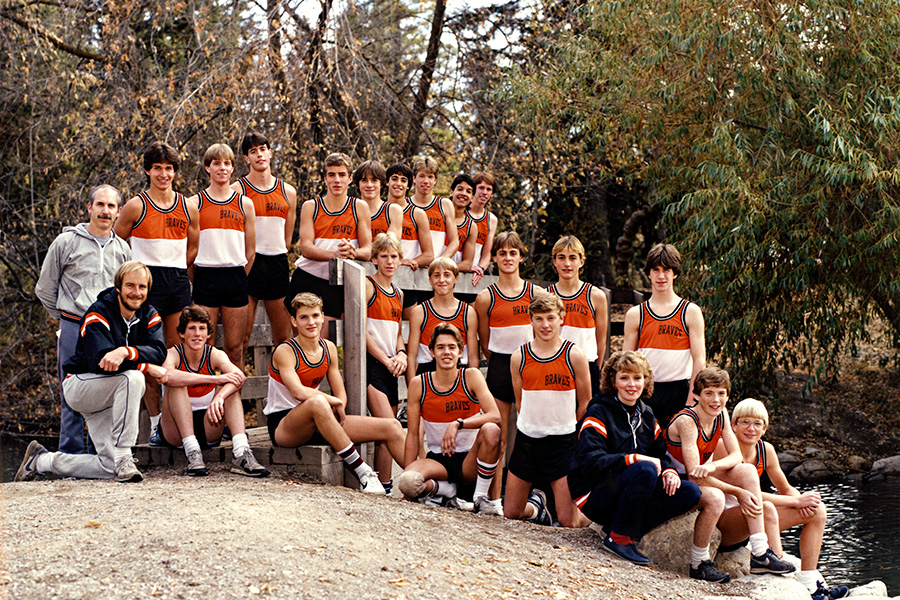The Legacy of Coach J
After 45 years at Flathead High School, Paul Jorgensen retires as the most decorated cross country coach in Montana history, beloved by generations of runners
By Myers Reece
During Zoe Nelson’s storied Flathead High School cross country career, in which she won four state titles and a national championship, her biggest adversary might have been scheduling. Specifically, the ambitious teenager wanted to train twice a day, which meant sneaking in a pre-dawn run, but her parents didn’t want her to go alone in the dark.
Fortunately, head coach Paul Jorgensen had a solution. He would drive to Nelson’s house at 5 a.m., unload his bike that was equipped with a light, and pedal next to her while she ran, multiple mornings a week.
“He definitely put the hours in,” Nelson recalled recently. “He put more time in than most people put in for their high school teams. It’s why he was so successful. He was constantly on duty.”
Jorgensen, affectionately known as “Coach J,” put in the hours for nearly a half-century, up until his November retirement as Flathead’s cross country coach, although he will coach track in the spring. After 45 years at the helm, he leaves behind a legacy as the most decorated high school cross country coach in Montana history, with two national coach of the year awards, 25 state coach of the year honors, 24 state team titles, 22 individual state champions, a national No. 1 team, and, in Nelson, a national champ.
While Nelson is one of the bigger names to emerge from Jorgensen’s program, she is but one of hundreds to witness firsthand his unrelenting dedication, which neither darkness nor age nor knee injury could diminish. Jorgensen, 72, might be stepping away from the program that he built into a powerhouse, but it will forever be stamped with his unmistakable imprint.
“I just enjoyed working with the kids,” Jorgensen said in explaining his longevity. “They keep you young.”
Growing up in Helena, Jorgensen didn’t run cross country, a sport still in its infancy. He took up recreational running as a student at Montana State University, and after he moved to Kalispell for a teaching job, Flathead High School activities director Ken Siderius offered him the head coaching position of the boys cross country program in 1972. Six kids showed up the first year, forcing Jorgensen to hit the hallways in search of recruits for a sport he knew little about.
“I didn’t even know how to score a cross country meet at the beginning,” Jorgensen said, adding that he purchased the only two cross-country books he could find and studied them. “It was a steep learning curve.”

Jorgensen took over the girls program as well in 1979, and the following year the girls won the state title. He continued coaching both boys and girls by himself until the mid-1980s, when Fred Longhart came on as assistant coach.
“You have 25 to 30 kids out on the road with you, that’s tough,” he said. “Bringing Fred in made a huge difference.”
Jorgensen’s first boys state champion team was the famous “Dog Team” of 1985, which rose to No. 1 in the country among all schools regardless of size. Jorgensen benefited from a literal in-house pipeline for athletes, with his wife, Jeannie, coaching middle school cross country and grooming a number of his future running stars.
The more his teams won, the harder Jorgensen worked, motivated by a desire to build a lasting culture of success. He developed an even-keeled coaching style, based on his personality, through which he reached kids with few words and no shouts. Soft-spoken by nature, he wanted to give his athletes enough skills and motivation to succeed, but he was careful not to push too hard, believing that runners should find their potential on their own, guided by the foundational tools he provided.
“He was the most natural coach I’ve ever had,” said David Vidal, a two-time state champion who ran for Jorgensen at Flathead from 1997-2000 and then at Stanford. “His coaching style was laid back, which was perfect for high school because it allowed us to develop our own love for the sport — he led us naturally to develop into the athletes we wanted to become, to tap into what we were naturally.”
“His style was to be a constant presence and have a calm demeanor, someone who knows very, very well how to coach but doesn’t force it on you,” Vidal added.
Jorgensen ran with his teams during practice for many years until a knee injury, suffered while coaching pole vaulting, forced him to take up the bike, which altered his mode of transportation but not his enthusiasm. He pedaled alongside Nelson on those early-morning runs and with Vidal and his teammates wherever they trained, from Jewel Basin to the Pig Farms. He traded in the bike for buses and planes to follow his athletes to meets across Montana, as well as to regional and national competitions out of state.
“I don’t remember a high school event or moment that he wasn’t part of,” Vidal said. “In some of my favorite pictures, he was there with us. It’s just a testament to his dedication to make those trips for us.”

The Flathead boys cross country team won six straight state titles from 1997-2002. Vidal was on four of them, including one that was ranked second in the country, the program’s highest national ranking since the 1985 Dog Team. Vidal’s teams were tight-knit, in no small part because of the culture that Jorgensen cultivated.
“We loved it; we enjoyed it,” Vidal said. “We traveled all over the valley — it was our social group. Coach J fostered that enjoyment of the sport and making you look forward to it every day.”
But Jorgensen knew enjoyment could be fleeting, and he preached the importance of seeing the big picture.
“We had a motivated group, and he was very appropriately holding us back, making us look at college and look at the long-term picture,” Vidal said.
Those lessons would crystallize when Vidal started coaching at Stanford following his collegiate running career. Vidal recalls coming back from California on breaks to pick his mentor’s brain, and his appreciation only grew for Jorgensen’s ability to prevent injuries and stave off burnout in his athletes.
“A lot of us ran in college, and we’re still active; we still run,” Vidal said. “I attribute that to him allowing us to enjoy it and also allowing us to stay healthy. There’s no question he’s the reason I enjoyed running and kept running.”
Harder to quantify than championships and awards is a coach’s impact on athletes’ lives, but the fond remembrances of his runners are proof that the legacy of Coach J stretches far beyond record books.
“It’s no accident that the program was what it was,” Nelson said. “He certainly created it. The enthusiasm and magic that was around the program, I hope that doesn’t go away, but it will be really hard to replace him.”